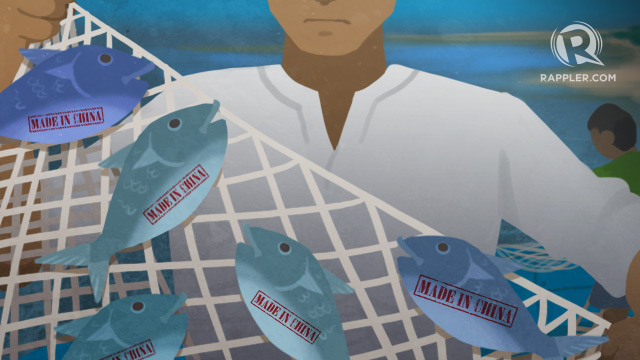 The restoration of Filipino fishers' access to Bajo de Masinloc (Scarborough Shoal) is a direct result of President Rodrigo Duterte's high-profile pivot to China. News reports over the past few days indicate that Filipino fishers have been able to fish unmolested both around and inside the shoal itself, despite continued presence of China Coast Guard vessels in the immediate vicinity.
The restoration of Filipino fishers' access to Bajo de Masinloc (Scarborough Shoal) is a direct result of President Rodrigo Duterte's high-profile pivot to China. News reports over the past few days indicate that Filipino fishers have been able to fish unmolested both around and inside the shoal itself, despite continued presence of China Coast Guard vessels in the immediate vicinity.
Recent satellite imagery released by the Asian Maritime Transparency Initiative (AMTI) reveals that the Chinese Coast Guard continues to hold station at the mouth of the main entrance to the shoal’s lagoon, while Philippine boats hover at the shoal’s perimeter.
AMTI suggests that the CCG continues to block entry into the shoal; however, it should be kept in mind that an obstacle at the shoal’s entrance affects only larger vessels with deeper draught (the depth of a floating vessel’s bottom). Philippine traditional wooden bancas that are smaller and lighter could conceivably enter the shoal at any point along the perimeter under the right tidal and sea conditions, as long as they can find an appropriate opening in the reef structure.
Satellite imagery is also literally a mere snapshot of a single moment in time; fishing boats might have merely been anchored to await more favorable time and sea conditions for fishing. The latest reports from Zambales and Pangasinan also indicate that at least some fishermen have actually been able to reenter the lagoon itself.
Beijing retains upper hand
Far from being a return to the status quo before 2012, however, the present situation at Scarborough is a demonstration of the new normal in the West Philippine Sea.
The continuing presence of the Chinese Coast Guard vessel, standing guard and keeping a watchful eye over the shoal, is both symbol and evidence of China’s maritime administration and control.
Comparing the statements of officials from opposite sides of the South China Sea, what emerges is that Beijing retains the upper hand while Manila has essentially downgraded the nature and status of its rights over the contested reef. Official statements of the Ministry of Foreign Affairs of China insist that its exercise of “normal jurisdiction” remains “unchanged” although China has made “proper arrangements” in response to President Duterte's concern about the fishers’ welfare. In contrast, Philippine officials argue that the Philippines has not given up its claims, but has denied raising or asserting its territorial rights with China, ”but they respect our traditional rights.”
In international law, the concept of traditional fishing rights refers to one State's exceptional claim to rights to fish in the waters of another State. The Philippines' satisfaction merely with China’s respect for traditional fishing rights is therefore double-edged: while it may have provided a basis for de-legitimizing China’s actions against Filipino fishers, it came at a huge cost of recognizing the non-exclusivity of Philippine fishing rights and implicit acceptance of the proposition that China may actually have legitimate (albeit contingent) rights over Scarborough Shoal.
The latter constitutes a retreat from the actual positions of the Philippines prior to 2012, that were legally premised on pre-existing absolute sovereignty over the high-tide features of the reef and exclusive rights to the exploitation of its resources. Not even the 1987 Constitution can preserve these premises against the arbitration award; after all, it was the Philippines that initiated the proceeding that resulted in this finding, and it is legally and morally bound to comply.
The tactical victory of restored access to fisheries resulted in the downgraded territorial status of Scarborough Shoal, which is actually a strategic loss. The administration of President Duterte only stands to hammer the final nail in the coffin on the Philippines’ rights to Scarborough Shoal if it continues along its present track without deeper reflection and deliberation.
Moreover, the Philippines accepted a priori that Scarborough Shoal is a “disputed” area that generates a territorial sea, which creates a territorial enclave governed by a legal regime entirely separate from the exclusive economic zone (EEZ) around it. The status of that enclave being merely “disputed” and therefore uncertain, it may no longer be covered by the usual rules that normally apply to other parts of the archipelago that are not subject to dispute by any other State.
The national territory is constitutionally defined to include, among others, “all other territories over which the Philippines has sovereignty or jurisdiction.” Official recognition that sovereignty or jurisdiction over the shoal is no longer absolutely certain or exclusive lays the basis for considering it to be no longer a definite part of the national territory.
Duterte should find win-win solutions

In this context, the government’s refusal to conduct sovereign patrols of its EEZ and the disputed areas, and the diplomatic silence on its territorial and jurisdictional claims for fear of provoking China may take on a different legal meaning.
The actual exercise of jurisdiction is the last remaining link that connects the shoal to the national territory according to our constitutional framework. President Duterte cannot stay silent and allow sole and exclusive presence and administration by Chinese Coast Guard ships for long without substantively and effectively diminishing the Philippines' legal position.
Considering the Chinese Coast Guard's continued sole presence and declared administration of the shoal, failure to assert and exercise such jurisdiction amounts to a tacit abandonment of Scarborough Shoal as an integral part of the archipelago, and the denigration of its status to a mere fishing ground possibly owned by another State.
The country’s only hope will then lie in considering joint development and management arrangements: if it cannot hold on to it exclusively as integral parts of its territory, then it might at least be able to maintain access to its resources and benefits. It should be clear that if this proceeds under current circumstances, then on balance, even proposed “win-win” solutions like turning Scarborough Shoal into an international protected area will actually turn out to be “win-loss” solutions, for the simple reason that the Philippines thereby accepts the prospects of China’s rights and presence where there used to be none.
To be fair and objective, it should also be clear that this is not purely the making of the administration of President Duterte. The administration of President Benigno Aquino III after all carried out the legal strategy that created this legal setback. It is not unusual that a series of complicated and risky legal maneuvers could result in potential gains and losses.
Here, the tactical victory of restored access to fisheries resulted in the downgraded territorial status of Scarborough Shoal, which is actually a strategic loss. The administration of President Duterte only stands to hammer the final nail in the coffin on the Philippines’ rights to Scarborough Shoal if it continues along its present track without deeper reflection and deliberation.
Left unchecked, this track ultimately leads to territorial acquiescence in exchange for economic gain. Whether this is a bargain that the Filipino people are willing to accept should be a decision based on deliberate and informed choice, not neglected and uncontrolled circumstance. This highlights the importance of the Duterte administration's actions in the post-arbitration era. – Rappler.com
Dr Jay L. Batongbacal is Associate Professor, University of the Philippines College of Law and Director, UP Institute for Maritime Affairs and Law of the Sea. Aside from teaching law, he undertakes research on maritime affairs, including Philippine and US maritime security policies and the Rule of Law in the South China Sea disputes.